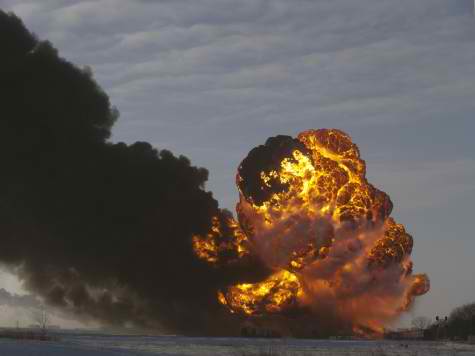The environmental group Earthjustice, funded by George Soros and joined by the Sierra Club and ForestEthics, is suing the U.S. Department of Transportation (DOT) in order to prevent crude oil from North Dakota’s Bakken formation to be moved to California.
The suit is reportedly in reaction the Kern County Board of Supervisors’ approval last Tuesday of Alon USA Energy’s plan to expand the rail terminal at its Bakersfield, CA refinery. The expansion of the terminal would create the state’s largest crude-by-rail facility and allow the terminal to import five times as much crude oil by train as it already does,
Earthjustice is also claiming that the state’s railroad bridges, which help transport the crude oil and are owned by private companies, are unsafe. Earthjustice asserts that railroad cars called DOT-111s, which carry oil, are antiquated, and has asked the DOT to issue an emergency order to stop the DOT-111s from carrying the oil.
Although the DOT has plans to replace the DOT-111’s, a lawyer for Earthjustice, Patti Goldman, told public radio station KQED, “They would still allow these railcars to be shipping crude oil and hazardous materials for about four more years. And that’s just too long to expose the public to these types of risks.” Citing July’s accident in Quebec in which a train carrying Bakken crude exploded, killing 47 people and triggering the Canadian government to jettison its oldest tank cars, Goldman said, “The worst tank cars are likely to shift from the Canadian fleet to the U.S. fleet unless the secretary of transportation acts [to ban them].”
KPIX has asserted that DOT-111s have been bringing crude oil to a rail yard in Richmond. Two new crude-by-rail terminals are in the works in the Bay Area; one in Pittsburg and at the Valero refinery in Benicia.
Meanwhile, even though the California Public Utilities Commission (CPUC) has plans to create a state railroad bridge inventory and add two inspectors in order to examine the safety of the bridges, Suma Peesapati, an attorney with Earthjustice, still called for the crude oil shipments to be stopped. She told the Contra Costa Times, “Two more inspectors is better than none, but it’s really a Band-Aid. I think there should be no crude by rail over those bridges until there’s a comprehensive look at all of them…It’s part of the infrastructure that’s dilapidated, not only in California, but across the country. Bridges are really an example of the problem.”
The CPUC estimates there are roughly 5,000 California railroad bridges in the state, the Times notes.
In the CPUC’s annual Railroad Safety Activity Report to the state Legislature last November, it called the railroad bridges a “potential significant rail safety risk….There are many unknown questions regarding bridge integrity that need to be answered to ensure public safety.”
However, American Society of Civil Engineers past President Andy Herrmann stated that leaving the safety of the bridges in the hands of private companies was better than leaving the issue to the government. “There’s a very strong profit motive to keep the bridges open. Detours will cost them a fortune,” he said, the Times reports.
It is not only profit that motivates the private rail companies to maintain their vigilance, but also fines ranging up to $100,000 from the Federal Railroad Administration.
Some conservatives contend that environmentalists’ objections to pipelines are, ironically, making crude-by-rail the only economically viable alternative, though it is arguably more dangerous.

COMMENTS
Please let us know if you're having issues with commenting.